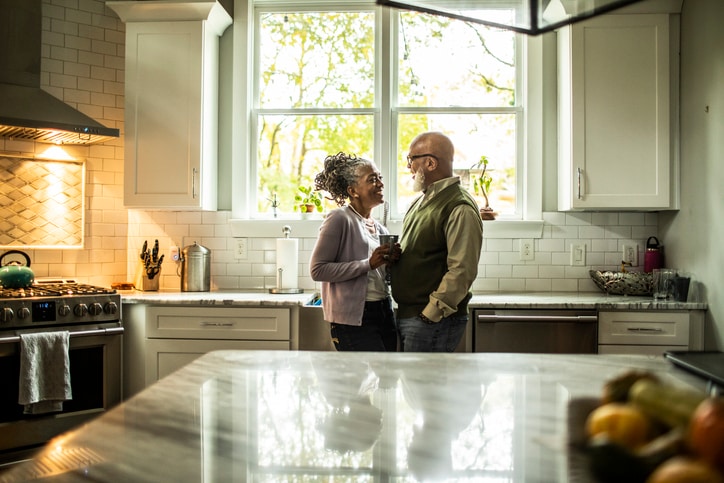No emergency situation is simple, but those with seniors can be even more complicated due to numerous medications, doctors, insurance coverage and the degree of chronic or acute illnesses involved. And when there are a mix of family members or caregivers involved, it becomes even more essential to have this information in a centralized location to keep everyone on the same — and most updated — page.
Teri Dreher, a registered nurse and patient advocate in Illinois, calls this organized information the “grab and go” folder, that could make a difference in a time-sensitive emergency. “When people are ill, no matter what the age, they forget critical information that can easily lead to medical error,” she says.
Plus, having this key information all written down isn’t just helpful for preventing miscommunication with patients or caregivers. “This helps EMS crews and doctors appropriately treat someone more readily and follow the patient’s wishes,” explains Dr. Brittany Brinley, an internal medicine physician and nursing home provider in California.
Below is a comprehensive list of information and documents to keep on hand, so you’ll be prepared.
What to include on your senior care emergency checklist
1. Standard personal information. Start the list with the basics, advises Tim Murray, CEO and President at Aware Senior Care. That inclues the senior’s name, phone number, age and address. It’s also important to check that the house number is clearly visible from the street in the event an ambulance needs to be called in the future.
2. Doctor info. Physicians’ names, their specialties, phone numbers and if there’s any key updates from recent visits.
3. Hospital info. Preferred hospital if there is one based on experience, doctors or local options.
4. All allergies, medications being taken, the dosage and what the prescriptions are for. Be sure to keep the information updated as the medications may change frequently. “As we know, medications can have interactions with each other, so a medicine given to save someone’s life may interact with another medicine that they may have taken that morning which can cause an adverse reaction,” explains Dr. Brittany Brinley, an internal medicine physician and nursing home provider in Beverly Hills, California.
5. Their relevant past medical history and current health conditions. “It’s important to know prior conditions like heart disease, diabetes or seizures,” says Brinley. “This information helps EMS and doctors guide treatment more quickly because we know the most likely causes to check for.”
6. Medical insurance, prescription plans and identification numbers.
7. Social security number. Many insurance companies won’t talk to anyone without the patient’s social security number.
8. Durable power of attorney. This legal document that gives someone the authority to handle legal and financial issues if your parent or elderly relative becomes incapacitated.
9. Health care proxy. This legal document gives someone the authority to make medical decisions for your parent or elderly relative. “The health care proxy, in addition to naming an agent, should include HIPPA authorization; treatment choices if desired for end of life and an opportunity to express preferred directions,” says Mary Kate D’Souza, a former family caregiver, eldercare attorney and Chief Legal Officer of Gentreo, an online health and estate planning company.
She elaborates, “If a senior doesn’t have these documents, loved ones may be forced to go to court to get authority to act for them. And if there’s conflict among your loved ones, the court may appoint a neutral third party. So a stranger will make potentially the most important decisions for you. No one wants that outcome.”
10. A Physician Orders for Life-Sustaining Treatment (POLST) or advance directive. These can outline a loved one’s wishes for treatments to prolong life should they be incapacitated including dialysis, tube feedings, blood transfusions and medication and life support. Do you know their wishes? Knowing this information before a crisis can be crucial to the way in which you handle it.
11. Their code status or do not resuscitate wishes. “Not to be morbid, but this is very important for someone to have on hand,” explains Brinley. That’s because when someone is unresponsive, the natural thing is to try to revive them if they don’t know they’re DNR status.
“Many times seniors are brought into the ER already having received chest compressions and placed on life support but when family arrives, they’re upset because it is against their loved ones wishes,” she says. “This situation is even more difficult, because once on life support (breathing machines, blood pressure medications and even cardiac support), who will decide to stop this treatment? It is a very difficult position for family and loved ones to be in.”
12. Basic financial records. A list of assets, account numbers, names and contact information for financial advisors or bank representatives.
13. Names and addresses of people to notify in case of an emergency. Think children, grandchildren, close friends and neighbors who might be able to help out. Murray recommends the list include at least three family members and to clearly note if anyone has power of attorney.
14. Names and contact information for local clergy, if your parent or elderly relative has a preferred religious affiliation. Plus, it’s helpful for the emergency room doctor to know if the patient has religious practices that he or she ascribes to that prevents certain medical procedures, adds Dreher.
A few additional rules of thumb
-
Be sure to keep this information up to date.
-
It should also be placed in the home in an easy-to-find location, such as near the phone in the kitchen or in another commonly used area — and the older adult, family members and caregivers should all agree not to move it from this spot. “I would recommend having it clipped together and on the fridge,” says Katie Dodd, a geriatric dietitian. “This way it can be easily found even if the senior is not able to communicate.”
-
A copy should also be given to another family member, caregiver or friend.
-
Gather a few key documents for a trusted family member to keep in one place, recommends Brinley. These should include a copy of their living will, life insurance information and any preset funeral arrangements.
Hopefully you’ll never need this information, but if there is a medical emergency with your elderly parent or relative, having an emergency checklist and other important documents at the ready can make a huge difference in your loved one’s well-being.





